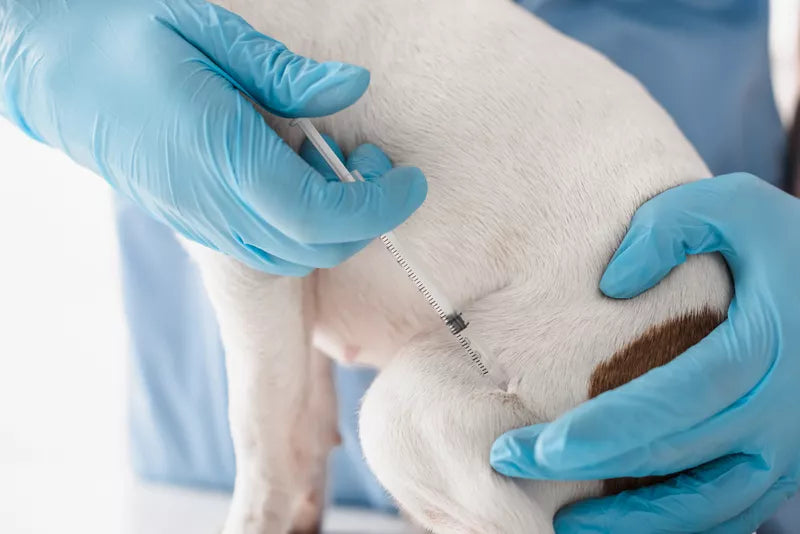Dog vaccines are important to every dog’s veterinary care. But deciding on what vaccines to give to your dog can be confusing and learning the dog vaccination schedule can seem overwhelming. There are vaccines that are considered mandatory (core vaccines for dogs) and there are those that are sometimes recommended by your vet for your pet’s overall health (non-core vaccines for dogs). To help you identify them and comprehend how often your dog needs which vaccine shots, we have come up with the basic dog vaccination schedules for you to follow. Well look at the DAPP vaccine schedule, DHPP vaccine, rabies vaccine for dogs, and more.
You should start your dog vaccine schedules as soon as you get your puppy and generally, this is between 6 and 8 weeks. According to the American Kennel Club, this is the optimum age to bring home a puppy. Most responsible breeders will start core vaccination schedules before you bring your puppy home, especially when you bring your new puppy home at 8 weeks old. But pet parents have a lot to know about which vaccines their dogs need and how the dog vaccine schedules work once they bring their new furbaby home.
"The DAPP dog vaccine protects your furbaby against four dangerous diseases: Distemper, Adenovirus, Parainfluenza, and Parvo"
In this article, we’ll go over dog vaccination schedules also known as dog shot schedules, which vaccines are considered core dog vaccines and which are considered non-core dog vaccines, and estimated dog vaccinations costs.
CORE DOG VACCINES
Core vaccines are considered to be required for your dog. Depending on where you live, these may be required by law. Otherwise, these are considered basics by veterinarians. These vaccines include the following:
DAPP Vaccine for Dogs
What is DAPP vaccine for dogs? What is a DAPP shot for dogs for? The DAPP dog vaccine protects your dog against four dangerous diseases: Distemper, Adenovirus, Parainfluenza, and Parvo. What is the DAPP vaccine schedule that is recommended? The DAPP vaccine for puppies starts at 8 weeks old. After that, the DAPP dog vaccine must be given in 3 boosters 3 weeks apart. The 3rd booster is good for a year and from there, the DAPP dog vaccine must be given every 3 years after or based on your vet's recommendation.
The DAPP vaccine is considered to be a core vaccine and highly recommended for all dogs because the viruses it protects against can be highly contagious and severe. Parvovirus can be deadly and puppies are most susceptible. The DAPP dog vaccine protects your puppy from this as well as respiratory illnesses and more.
DAPP Vaccine Cost: $33-$42 per shot
DHPP Vaccine for Dogs
What is DHPP vaccine for dogs? The DHPP vaccine protects your furbaby from Distemper, Hepatitis, Parainfluenza, and Parvovirus. Commonly called the “distemper shot,” this combination vaccine actually protects against the four diseases in its full name. What is the dog shot schedule for DHPP? The DHPP vaccine for dogs is a single shot given to puppies in a series of injections beginning at 8, 12, and 16 weeks, a year later, and then 1 to 3 years after that or based on your vet's recommendation.
Dog DHPP Vaccinations Cost: $33-$42 per shot
Note: The DAPP vaccine for dogs is very similar to DHPP. The A in DAPP stands for “adenovirus”, while the H in DHPP stands for “hepatitis”. Adenovirus is an infection that causes hepatitis in dogs. Your vet may advise you to use a DHPP vaccine for dogs or DAPP vaccine. Based on your area, breed, and other factors, it is always a good idea to consult your vet for dog vaccination schedules and guidelines.
Rabies Vaccine for Dogs
The rabies vaccine for dogs is arguably the most well known dog vaccine. Rabies virus is fatal and all mammals, including humans, can easily acquire infection. The Rabies virus is secreted in saliva, so it is most often passed through a bite wound from a rabies-infected animal. When a bite damages the skin of your dog, the virus can penetrate the bloodstream. It can also be passed on via an open wound that is exposed to the saliva of an infected animal, particularly through licking. Each year, according to PetWebMD, about 400 to 500 cases of rabies are reported in cats, dogs, and ferrets. The good thing is that rabies is 100% preventable with dog rabies vaccination.
The rabies vaccine for dogs tells your furbaby’s body how to identify the rabies virus and create immune system responses that will eliminate the virus should it ever be acquired by your dog. As mentioned by PetMD, there are different laws regarding the required dog rabies vaccination schedule in every state. The majority of the states state that the first shot of rabies vaccine for dogs must be given on or before the pup is 16 weeks old. The second dog rabies vaccine shot is then given a year after the first one. Booster shots of the rabies vaccine for dogs may be given a year or three years after, depending on the type of rabies vaccine and the laws of the state you are in. The American Veterinary Medical Association has come up with a consolidated chart on State Rabies Vaccinations Laws Explore More.
Dog Rabies Vaccine Cost: $15-$25 per shot
NON-CORE VACCINES FOR DOGS
Non-core vaccines for dogs are elective vaccines that must be weighed in light of the exposure risk of your furbaby to certain diseases. The dog vaccine schedule for non-core vaccines may vary a bit. Also called lifestyle vaccines, these may be recommended by a vet based on your dog’s environment, lifestyle, or health status. Several of the diseases are frequently self-limiting or react immediately to medication. These noncore dog vaccines include the following:
Lyme Vaccine for Dogs

Is there a vaccine for lyme disease? Yes! The Lyme disease vaccine for dogs helps prevent Lyme disease in dogs, a bacterial infection that is disseminated by black-legged ticks that carry the spirochete bacteria identified as Borrelia burgdorferi. When an infected tick bites your furbaby, the bacteria is passed on. Ticks are not hatched already carrying the spirochete bacteria. They get it when they feed on infected hosts (like mice). The bacteria stay in their gut and when they feed again (this time on your dog), the bacteria is now on the salivary glands and is carried into your furbaby's bloodstream.
According to American Animal Hospital Association guidelines, two initial doses are given to your furbaby 2 to 4 weeks apart. For the first dose of Lyme vaccine dogs can be as young as 8 or 9 weeks old. If you live in an area with a high risk of exposure, your dog must be given one shot of Lyme vaccine one year after the two initial doses and then yearly. However, this will still depend on your vet’s evaluation and your pet’s medical history.
Does My Dog Need a Lyme Vaccine?
Lyme vaccine for dogs are needed most by dogs living in areas with a high risk of exposure to Lyme diseases, those dogs who live in homes with untrimmed lawns and bushy environments, and those who spend most of their time outdoors. The Lyme vaccine dogs receive can help protect from tick-borne diseases, but it is not considered core. Pet parents should weigh lifestyle and potential risks with the lyme vaccine for dogs side effects that they could potentially encounter. Generally side effects include hives, diarrhea, lethary, or swelling. Talk to your vet to weigh out the benefits and potential side-effects of the lyme disease vaccine for dogs in your dog’s specific situation.
Lyme Vaccine for Dogs Vaccinations Cost: $36-$46 per shot
Lepto Vaccine for Dogs
The American Animal Hospital Association considers Leptospirosis a “non-core” vaccine for dogs. Lepto vaccine for dogs is an option you need to consider if you think your furbaby is at a high risk of easily contracting the disease, otherwise, it is not urged.
Leptospirosis is a bacterial disease that can impact the liver and kidneys. The Lepto vaccine is made to help prevent this disease from infecting your dog. Furbabies who are at risk of contracting leptospirosis can be given their first lepto vaccine for dogs as early as they are 8 to 9 weeks old, but many professionals advise waiting until they are 12 weeks old. The dogs should then be given a booster lepto vaccine 2 to 4 weeks later and then annually thereon.
Just like any vaccine, the Lepto vaccine can have side-effects. Lepto vaccine side effects include lethargy, loss of appetite, and anaphylactic shock in certain cases, according to VCA Animal Hospitals. Consult your vet to see if they recommend the Lepto vaccine for your dog.
Lepto Vaccine for Dogs Vaccinations Cost: $20-$26 per shot
Bordetella Vaccine for Dogs
What is a bordetella vaccine for dogs? Bordetella Bronchiseptica, simply known as the kennel cough vaccine, helps protect your dog from the onset of kennel cough. Bordetella in dogs (more commonly known as kennel cough in dogs) is a respiratory canine infection caused by the canine parainfluenza virus and Bordetella bronchiseptica. When these pathogens attack your furbaby, it will affect the respiratory tract lining and will cause inflammation of their airways. But, there is a kennel cough vaccine to help prevent this.
The kennel cough vaccine (bordetella vaccine) will help fight the bacteria away. If your dog is not vaccinated and gets kennel cough, they may suffer from breathing problems and inflammation which demands a lot more treatment than prevention with the bordetella vaccine. However, bordetella is not considered to be a core vaccine. It is recommended that you discuss the bordetella vaccine with your vet and decide based on lifestyle and surroundings of you and your dog.
What is the bordetella vaccine schedule? Puppies should be given the kennel cough vaccine when they are 6 to 8 weeks old. They should then be given the second booster of the kennel cough vaccine 4 weeks after, or when they are around 10 to 12 weeks old, and then annually thereafter.
Bordetella Vaccine Cost: $28-$36 per shot
Vaccinations prevent many illnesses in your furbaby. Dog vaccinations can help avoid expensive treatments and medications for diseases that can actually be prevented. Following a dog shot schedule can also help you protect your family and other pets at home. No vaccine is perfect, so sometimes vaccination does not fully absolutely prevent infection. However, in most cases it manages to make the disease much milder and more manageable if ever infection occurs. Dog vaccinations can have side-effects, so consult your veterinarian about which vaccines are recommended for your dog.

Keep in mind that vaccine costs will vary based on location and practice. Veterinarians will likely include an examination fee for the visit as well with any vaccine costs. You can call your local vet for estimated prices before bringing your new puppy home. There are also low-cost clinics in certain areas that may offer lower cost vaccines for your dog.
Strengthening Your Dog's Immune System
In addition to vaccines, there are some other ways to strengthen your dog's immune system. Dog supplements are one of these ways! Supplements for dogs can help with a variety of immune functions and support. Pet Parents® Multivitamin SoftSupps® are safe for all life stages including puppies. These dog vitamin supplements contain no fillers, only whole ingredients, active ingredients, and branded "super ingredients" like PurforMSM® which can help maintain cushion between joints for mobility.
Just as certain vaccines are targeted towards certain lifestyles, like the lyme vaccine for dogs, certain supplements can help dogs prone to certain issues. Pet Parents® Hip & Joint SoftSupps® for example are an excellent supplement for dogs prone to hip and joint diseases like hip dysplasia. This is common is breeds like Labrador Retrievers, Golden Retrievers, German Shepherds, and Great Danes. You can learn more about the benefits of supplements for your dog's overall health and which supplements you should consider giving Explore More.
All dogs are different. It is important to have your dog vaccinated only by trusted vets and consult them to identify the appropriate dog vaccine schedules specific to your furbaby. From the DAPP vaccine for dogs, to bordetella vaccine, there are many options to help keep your dog happy and healthy. These listed dog vaccination schedules can be used as a guide to help you time out dog vaccines and stay on track. Remember to consult your vet with any concerns and to determine the best dog vaccination schedule for you and your furbaby.











